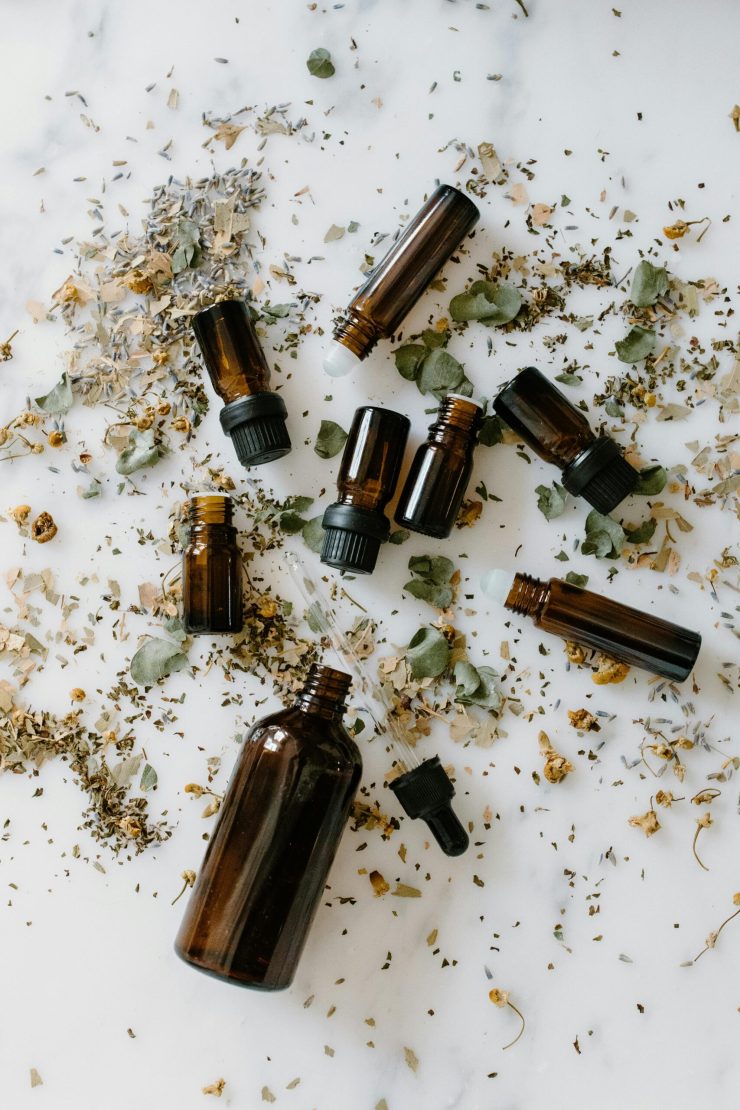
Introduction: More Than Just a Scent
When you think of patchouli, chances are your mind drifts to incense sticks or old-school perfume bottles. But don’t be fooled—this earthy herb, native to Southeast Asia, has been a healing tool in Ayurveda, Chinese medicine, and aromatherapy for centuries.
Today, science is catching up with tradition. Whether you’re dealing with stress, skin issues, or a weakened immune system, patchouli might just be your plant-powered secret weapon.
1. Bioactive Compounds: What Makes Patchouli Potent?
The therapeutic power of patchouli comes from its essential oil, extracted from the leaves of the Pogostemon cablin plant. Its key bioactive compounds include:
- Patchoulol (also known as patchouli alcohol) – Primary component with anti-inflammatory, antimicrobial, and sedative effects.
- α-Bulnesene and α-Guaiene – Terpenes that contribute to antioxidant and skin-calming properties.
- Caryophyllene – A sesquiterpene known to interact with CB2 receptors (linked to immune regulation and pain).
These compounds give patchouli its distinctive smell and its medicinal potential.
2. Absorption & Digestion: How It Works in the Body
Patchouli is typically used topically or inhaled, rather than ingested. Here’s how your body absorbs it:
- Topical Use: When applied with a carrier oil, patchouli’s compounds penetrate the skin, interacting with local tissues and entering the bloodstream slowly.
- Inhalation: When diffused or smelled, volatile compounds stimulate the olfactory nerve, sending calming signals to the limbic system (the brain’s emotional center).
- Oral ingestion is not recommended unless under medical supervision, due to limited studies on its internal metabolism and potential toxicity at high doses.
3. Health Benefits: Backed by Tradition & Science
Patchouli’s uses go far beyond fragrance. Here are some of its clinically supported benefits:
🌱 1. Skin Healing & Anti-inflammatory
Patchouli oil shows wound-healing effects due to its antibacterial and anti-inflammatory compounds. A study in Pharmaceutical Biology (2017) found that patchoulol enhanced skin regeneration and reduced inflammatory markers in dermal injuries.
🔬 Reference: Han, X. et al. (2017). Pharmaceutical Biology, 55(1), 154–162.
🌬️ 2. Anti-Stress & Mood Enhancer
In aromatherapy, patchouli is considered grounding and calming. A 2013 animal study found it reduces cortisol levels and anxiety-like behavior, likely by modulating neurotransmitter activity.
🔬 Reference: Ueno-Iio, T. et al. (2013). Journal of Natural Medicines, 67(3), 456–463.
🛡️ 3. Immune System Support
Patchouli essential oil exhibits antiviral and immune-regulating effects, helping the body resist pathogens. It may also support white blood cell activity and enhance natural immune defense.
4. How to Use Patchouli Oil Safely
Patchouli can be used in several ways, each with its own benefit:
🌼 Topical (for skin, scars, eczema)
- Dilute 2-3 drops of patchouli oil in 1 tsp of coconut, jojoba, or sesame oil.
- Apply to affected areas 1-2 times daily.
🌬️ Aromatherapy (for stress, sleep, focus)
- Add 3-5 drops to a diffuser.
- Blend with lavender or bergamot for extra calm.
🛁 Bath blend
- Mix 5 drops of patchouli oil with a carrier oil and a tablespoon of Epsom salt.
- Add to warm bathwater to unwind and relax.
⚠️ Avoid ingesting patchouli unless prescribed—some compounds may be toxic at high concentrations.
5. Ideal Dosage
There is no universal dosage since patchouli oil is used externally or aromatically. However:
- For topical use: 1–2% dilution is generally safe (i.e., 2 drops per tsp of carrier oil).
- For aromatherapy: 15–30 minutes of diffusion, 1–2 times daily, is ideal.
6. Risks, Side Effects & Precautions
While patchouli is safe for most people, a few cautions apply:
- 🚫 Don’t apply undiluted oil to skin—it can cause irritation or allergic reactions.
- ⚠️ Pregnant or nursing women should consult a doctor before use.
- ❌ May interact with sedatives or blood thinners due to its calming and circulation-enhancing effects.
💡 Patch test before first-time use by applying a diluted drop on your forearm and waiting 24 hours.
Conclusion: Patchouli’s Quiet Power
In a world full of over-hyped trends, patchouli offers time-tested benefits backed by science. Whether you need glowing skin, stress relief, or gentle immune support, this herbal oil proves that sometimes, the most grounded remedies come from the earth itself—literally.
Use it with care, respect its strength, and let it be part of your mindful wellness toolkit.
When you think of patchouli, chances are your mind drifts to incense sticks or old-school perfume bottles. But don’t be fooled—this earthy herb, native to Southeast Asia, has been a healing tool in Ayurveda, Chinese medicine, and aromatherapy for centuries.
Today, science is catching up with tradition. Whether you’re dealing with stress, skin issues, or a weakened immune system, patchouli might just be your plant-powered secret weapon.
1. Bioactive Compounds: What Makes Patchouli Potent?
The therapeutic power of patchouli comes from its essential oil, extracted from the leaves of the Pogostemon cablin plant. Its key bioactive compounds include:
- Patchoulol (also known as patchouli alcohol) – Primary component with anti-inflammatory, antimicrobial, and sedative effects.
- α-Bulnesene and α-Guaiene – Terpenes that contribute to antioxidant and skin-calming properties.
- Caryophyllene – A sesquiterpene known to interact with CB2 receptors (linked to immune regulation and pain).
These compounds give patchouli its distinctive smell and its medicinal potential.
2. Absorption & Digestion: How It Works in the Body
Patchouli is typically used topically or inhaled, rather than ingested. Here’s how your body absorbs it:
- Topical Use: When applied with a carrier oil, patchouli’s compounds penetrate the skin, interacting with local tissues and entering the bloodstream slowly.
- Inhalation: When diffused or smelled, volatile compounds stimulate the olfactory nerve, sending calming signals to the limbic system (the brain’s emotional center).
- Oral ingestion is not recommended unless under medical supervision, due to limited studies on its internal metabolism and potential toxicity at high doses.
3. Health Benefits: Backed by Tradition & Science
Patchouli’s uses go far beyond fragrance. Here are some of its clinically supported benefits:
🌱 1. Skin Healing & Anti-inflammatory
Patchouli oil shows wound-healing effects due to its antibacterial and anti-inflammatory compounds. A study in Pharmaceutical Biology (2017) found that patchoulol enhanced skin regeneration and reduced inflammatory markers in dermal injuries.
🔬 Reference: Han, X. et al. (2017). Pharmaceutical Biology, 55(1), 154–162.
🌬️ 2. Anti-Stress & Mood Enhancer
In aromatherapy, patchouli is considered grounding and calming. A 2013 animal study found it reduces cortisol levels and anxiety-like behavior, likely by modulating neurotransmitter activity.
🔬 Reference: Ueno-Iio, T. et al. (2013). Journal of Natural Medicines, 67(3), 456–463.
🛡️ 3. Immune System Support
Patchouli essential oil exhibits antiviral and immune-regulating effects, helping the body resist pathogens. It may also support white blood cell activity and enhance natural immune defense.
4. How to Use Patchouli Oil Safely
Patchouli can be used in several ways, each with its own benefit:
🌼 Topical (for skin, scars, eczema)
- Dilute 2-3 drops of patchouli oil in 1 tsp of coconut, jojoba, or sesame oil.
- Apply to affected areas 1-2 times daily.
🌬️ Aromatherapy (for stress, sleep, focus)
- Add 3-5 drops to a diffuser.
- Blend with lavender or bergamot for extra calm.
🛁 Bath blend
- Mix 5 drops of patchouli oil with a carrier oil and a tablespoon of Epsom salt.
- Add to warm bathwater to unwind and relax.
⚠️ Avoid ingesting patchouli unless prescribed—some compounds may be toxic at high concentrations.
5. Ideal Dosage
There is no universal dosage since patchouli oil is used externally or aromatically. However:
- For topical use: 1–2% dilution is generally safe (i.e., 2 drops per tsp of carrier oil).
- For aromatherapy: 15–30 minutes of diffusion, 1–2 times daily, is ideal.
6. Risks, Side Effects & Precautions
While patchouli is safe for most people, a few cautions apply:
- 🚫 Don’t apply undiluted oil to skin—it can cause irritation or allergic reactions.
- ⚠️ Pregnant or nursing women should consult a doctor before use.
- ❌ May interact with sedatives or blood thinners due to its calming and circulation-enhancing effects.
💡 Patch test before first-time use by applying a diluted drop on your forearm and waiting 24 hours.
Conclusion: Patchouli’s Quiet Power
In a world full of over-hyped trends, patchouli offers time-tested benefits backed by science. Whether you need glowing skin, stress relief, or gentle immune support, this herbal oil proves that sometimes, the most grounded remedies come from the earth itself—literally.
Use it with care, respect its strength, and let it be part of your mindful wellness toolkit.









